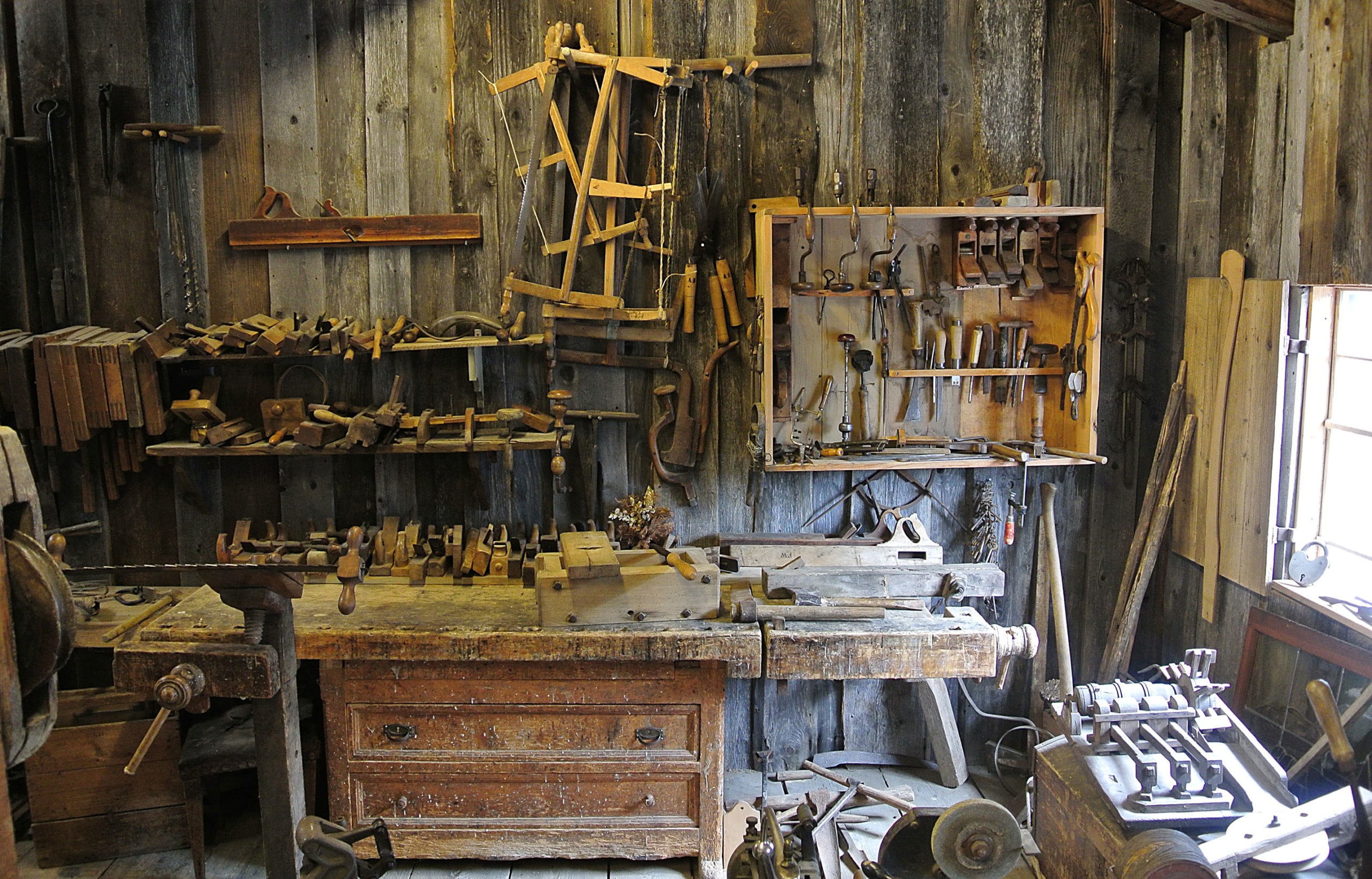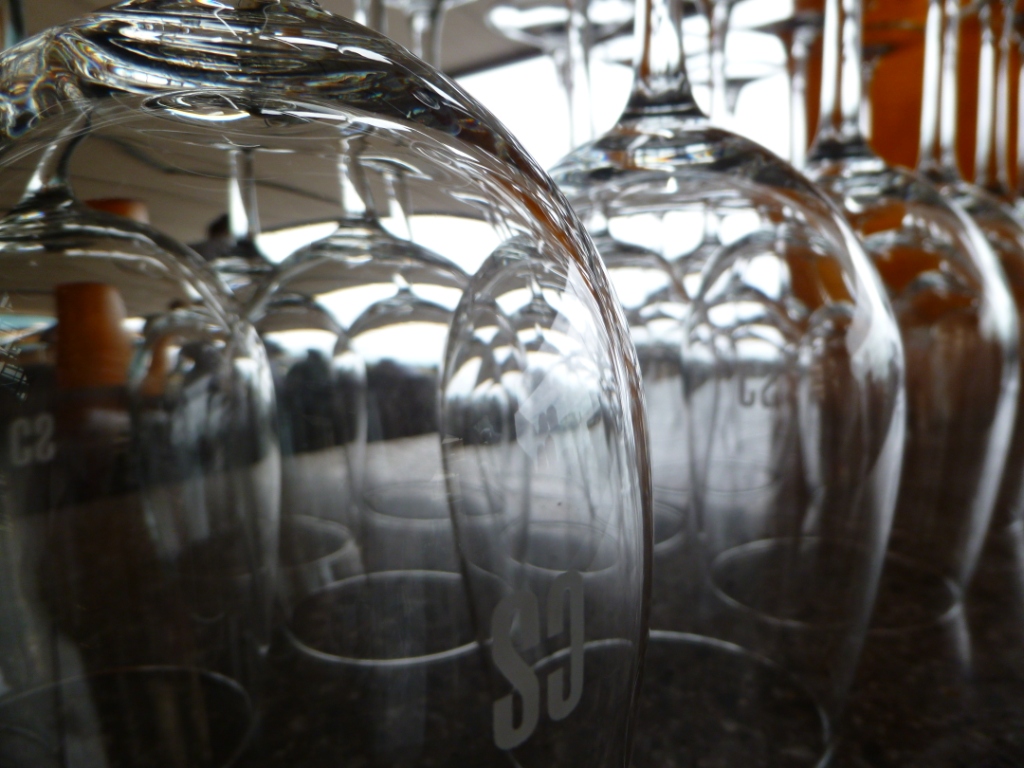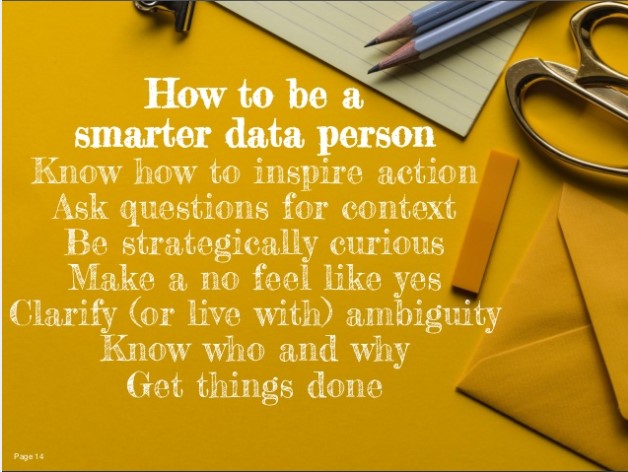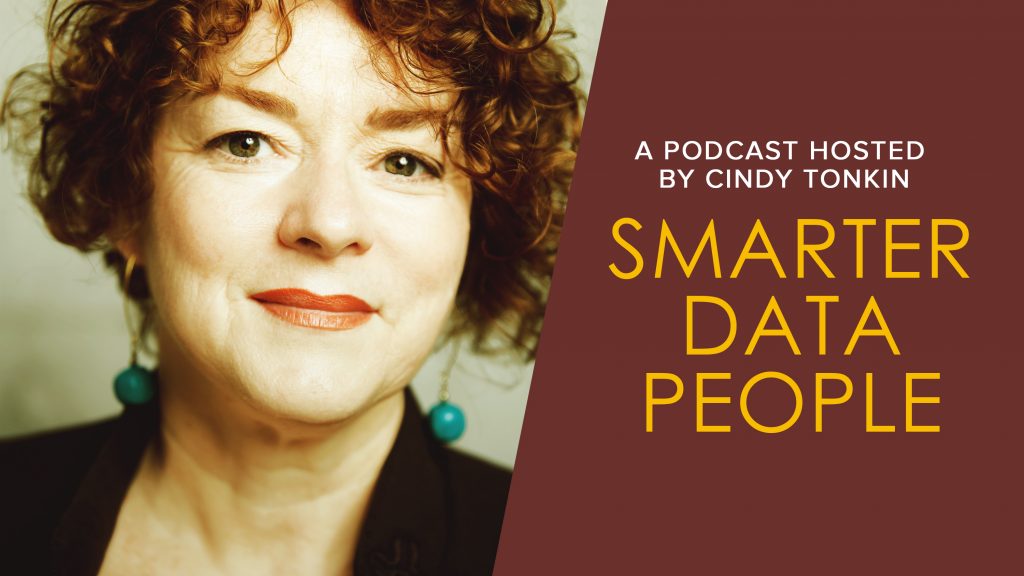
Gabe Mach is my guest on this podcast. Gabe is one of IAPA’s top 25 leaders in 2019. He’s entertaining, interesting and thought-provoking.
His background is in digital marketing and is refreshingly candid about his desire to make money to feed his family and have a nice life.
Our discussion touches on climate change (and the need for climate change management!), the supremacy of knowing how to learn and admitting you don’t know.
Cindy Tonkin: 00:00:07 Hi there, this is Cindy Tonkin. I’m the consultant’s consultant. I work with data science teams, helping them work even smarter, faster and nicer. We build analytics capability through improved productivity – soft skills, work process analysis, whatever it takes.
Cindy Tonkin: 00:00:25 Hello podcast listeners, this is Cindy Tonkin. Gabe Mach is my guest today. He’s one of the top 25 IAPA leaders this year, 2019 and last year as well. Isn’t that fabulous? The process of applying is quite complex I understand. It’s not like, you know, just tick a box and say, please make me the leader.
Gabe Mach: 00:00:51 No. It requires a couple of rounds and some video submissions. Then interviews off the back of that. Everybody says at every award show “It was an honour to be nominated” and I would’ve been happy with just a nomination. No, no, I’m stoked. I’m quite happy to take that.
Cindy Tonkin: 00:01:07 Tell me and my listeners a little bit more about what you do.

Gabe’s journey
Gabe Mach: 00:01:17 My background is digital marketing. Many, many years ago in another decade at another time, I started university with marketing and media and communications. It was quite a broad degree. Straight out of Uni I spent a couple of years in sales. From that learned very well how to communicate with people, and how to communicate with corporates especially. It was very much a high-end sales role.
Then got into my preferred field, which is marketing. I went straight to a Google ad words, as a reseller. So, I was working with Google ads straight off the bat. I’ve been to a couple of different agencies in Perth, in Western Australia. I’ve been client side as well. So, I’ve had my hands dirty with the whole spectrum of what digital marketing entails from email marketing, affiliate marketing.
My specialty is paid media, so anything you’re paying media for online. Google ads, Google display advertising, Facebook, Instagram, LinkedIn content, paid content advertising and branching out into a few different things as well. I’m currently the head of digital advertising at Bonfire, one of the search specialist agencies and Perth. We like to think we’re pretty good. We’ve won a few national awards recently, so we’re on a bit of a high.
My motivation for doing all of it, I try and treat this very simply. I have a young family, my motivation to make money is so that I can spend time with them. I can travel, I can spend the time
Gabe Mach: 00:02:36 My motivation for doing all of it, I try and treat this very simply. I have a young family, my motivation to make money is so that I can spend time with them. I can travel, I can spend the time.

Gabe’s Motivation
I meet business owners of varying calibres from enterprise government level to single owner operators and I say to them very candidly, “I’m in this to make money so that I can spend time with my family. What are you in it for? Oh, how interesting. You’re in it to do the exact same thing, making money so that you can spend time with your family. Hey, look, if you pay me, I can help you make money, which in turn does this thing that works for both of us”.
Gabe Mach: 00:03:15 That’s been my primary motivation. I’m in advertising. I don’t try and hide what I’m doing. I’m trying to sell here, but at the same time I find an amicable way of dealing with that something that’s a bit more.
Cindy Tonkin: 00:03:33 Essentially a higher purpose for doing the things that we do. Are there people who work for the work? Possibly, yes, there are. A lot of them would be in the boat you’re talking about – I only work so that I can do the things I want to do in the rest of my life. Not to say that what we do for work isn’t enjoyable, but it’s that balance. So, let’s start with what you do to keep yourself working smarter.
Do you have particular routines about how you run your brain, your body, or your gut, your world to be smarter?
Gabe Mach: 00:04:19 Yes, I have to. I’m in an industry which changes so frequently and so often that I cannot let rest on my laurels. The analogy I use in digital advertising is if you were a plumber it would be as if every five years the plumbing itself changed. Physically changed, material change, what it looks like.

Managing Change
Every three years the tools you use that you have to use change. Every year the direction in which you have to spin the tool changes. There’s no other industry out there that changes so rapidly
Every three years the tools you use that you have to use change. Every year the direction in which you have to spin the tool changes. There’s no other industry out there that changes so rapidly. I’ve looked at some industries like accounting and law and they do change relatively rapidly, but the core mechanics are the same.
Gabe Mach: 00:05:06 In marketing and digital specifically the core mechanics change so frequently that I joke with my team you cannot be averse to change. If you are uncomfortable when Google or Facebook changes something and you get complacent, you can’t get angry because it is a waste of energy. You’ll be doing it every couple of weeks.
If you are uncomfortable when Google or Facebook changes something and you get complacent, you can’t get angry because it is a waste of energy. You’ll be doing it every couple of weeks
So, what do I do? I try and stay update as often as possible to be ahead of those changes. But it’s very difficult when you’re dealing with multinational companies who don’t give you advance warning of these things very often.
Gabe Mach: 00:05:48 I am working with other data specialists at the moment to build tools, to review our own data, to review the oodles of data that we have to notice trends ahead of time and warn us if things that seem to have happened without our knowledge. Also I listen to other podcasts. read industry email subscriptions.
Cindy Tonkin: 00:06:12 Do you have particular favourites?
Gabe Mach: 00:06:12 Search Engine Land, Search Engine Journal, from a written perspective. This Week in Tech and This week in Google by Leo LaPorte for podcast material. They’d be my preferential outlets.

Working Smarter
Coming back to your original question, what do I do to work smarter and harder? How I do it is by using automation and making everything efficient. I know that every industry says that they’re trying to do that in every job. But I physically have tools available which are all about automation.
Gabe Mach: 00:06:49 In the digital marketing space, instead of manually controlling how much you want to pay for an ad here, there and everywhere, we use automation systems from Google.
Now it’s not AI, it’s machine learning. But they are smarter than humans. They have billions of signals of data available to change things in real time. We as humans just don’t have that rapid ability.
So, we use those systems to take over the minute tasks. The tasks that we have to look at every day or every couple of days so that we can step back, take our hands off those tools and ask, “strategically is this going in the right direction? Is this moving the needle?”
That does not always happen. I don’t know how much I can say without getting in trouble.
Cindy Tonkin: 00:07:31 Don’t give me anything that could somehow break your career.
Gabe Mach: 00:07:37 No I will say. The discussions we’re having with Google at the moment – because this would be reflective of an industry – are definitely around when to best use those automation tactics and also how to monitor them to make sure that they are actually moving the needle on the right direction. Because automation for the sake of automation is just as bad as leaving things manual.
Because automation for the sake of automation is just as bad as leaving things manual. For the most part, automation is definitely my best friend.
Gabe Mach: 00:08:00 For the most part, automation is definitely my best friend. It lets us take our hands off the tools and be more strategic. And I love that. Then you can start getting creative.

Lessons Learned
The things we’ve learned, and the experiment was done years ago, if every advertiser was using simple automation tools and just Google, you figure this out and find it as the best way to be seen. All of the ads will look the same. That system doesn’t work. It’s too much of a level playing field.
the cut through is creative, is a human being …humour and emotion
Gabe Mach: 00:08:27 So the cut through is creative, is a human being, is iteration with the text editor, and humour and emotion. It’s things that cut through. That’s where I definitely want to move into. I’ve got team members that are far more creative than me, so I rely on them for this.
But that automation piece definitely makes my day more efficient. It means that I don’t have to be on the tools as much. I’m creating alerts systems through custom APIs to allow me to take my hands off even going into look at things because it will proactively alert me when something’s wrong, right, or different.
Gabe Mach: 00:09:04 But they all require an end user, a human being to validate for example My website traffic and conversions and sales are down 50% month on month. Freak out! What’s happened? It’s because we spent 50% less. Within context that makes sense and is acceptable.
I’m interested in information, not data. Data is just raw numbers, raw metrics. Whereas information is something that can be gleaned and something useful and actionable.
But if you just look at one piece of data in isolation, it can cause major panic. My favourite throwaway line at the moment is, I’m interested in information, not data. Data is just raw numbers, raw metrics. Whereas information is something that can be gleaned and something useful and actionable.
Cindy Tonkin 00:09:41 Yeah, absolutely. So, your team is not just marketers and creatives but also analysts. Or are they creative analysts and creative data scientists?

Gabe’s Team
Gabe Mach: 00:09:56 I’ll try and think of a very lovely way of phrasing that. I like creative analysts, let’s call them creative analysts. Technicians or strategists is the industry term. Effectively they get the information from the advertiser and try and find the best way to cut through to their audiences and their custom target markets through the pay channels that we’re using.
Cindy Tonkin: 00:10:19 When you recruit these creative people who are also analytically minded and smart, what do you look for? What’s the cut through on that?
Every time it’s attitude. It’s not skills. It’s attitude.
Gabe Mach 00:10:37 Every time it’s attitude. It’s not skills. It’s attitude. Skills can be taught. I don’t know if it can be taught, but it’s certainly a lot harder if it is.
I’m currently dealing with some universities. I’m on a marketing consultative committee with one, the university of my alumnus university. The reason I got on board with that was because I gave them feedback. I told them I’m getting graduates from Unis at the moment and they’re coming in and they don’t even understand the terminology.
That’s fine. I don’t care if they don’t know what SEO and SEM and PPC and ROAS is, that can be taught, but they don’t know how to learn.
Gabe Mach: 00:11:17 You need to teach them how to learn. The one thing I got out of Uni was I learned to learn. And back in the day it was libraries and old computers. But if you were to ask me a technical question right now and I didn’t know the answer. I would say, I don’t know, let me verify that for you. And I’ll be an expert in five minutes because I could Google that. And that is a skill.
So what we are interviewing for and what cuts through is the attitude. I don’t mean happy-go-lucky cultural attitude, although that is very important for us. It’s the attitude and a very powerful statement of, I don’t know BUT, I can find that out and I can get the right answer for you given time.
what we are interviewing for and what cuts through is the attitude… It’s the attitude and a very powerful statement of, I don’t know BUT, I can find that out and I can get the right answer for you given time.
Gabe Mach: 00:12:06 I’m teaching helping my nephew with math homework at the moment in the primary school. We’re joking around the next time you’re ever going to need to use algebra and sine and cos and these things. I joke I don’t need to know these things because I have Excel at my hand. I have a calculator at my hand all the time. But if I don’t know how to do anything,
I know how to learn it. I know how to Google it and find out instantly. I don’t want somebody who’s going to wing it. In an interview, if I say “How would you do this?” And they try and wing through it. I’m like, “No. You shouldn’t be trying to figure that out”.

The attitude he looks for
You should be stopping, Googling it and watching the world’s expert do it on YouTube and then come back and do that. I don’t want my surgeon to be winging it. I’d rather they go and do the research. Why wouldn’t you expect the same of somebody managing a campaign.
I don’t want my, my surgeon to be winging it. Why wouldn’t you expect the same of somebody managing a campaign.
Cindy Tonkin: 00:12:53 Exactly. Put me under for five minutes. Do a bit of Googling and then do the surgery.
Gabe Mach: 00:13:00 I liked that, put me under. Put people under while I’m figuring it out.
look, I don’t know how to do a couple of the things you had on the job application. However, give me time and I’ll learn them or give me training and I’ll learn them… I’d rather you have said that than, “Oh yeah, I could do all this stuff”. Then when I put you on the spot, you actually don’t know
Cindy Tonkin: 00:13:04 The client doesn’t have to know that you’re going to see Google. The client can be unconscious. If you think of the wizard of Oz a concept, some of the people behind the curtain need to be able to say, to each other at least, I don’t know the answer, I’m going to find out. Like you say, I’ll be a world expert, give me ten. So, you recruit for attitude and that’s the big thing because it’s pretty easy to test for skills.
Gabe Mach: 00:13:44 Well it’s really easy to teach skills. My most recent hire definitely had skills but was very forthright in saying, “look, I don’t know how to do a couple of the things you had on the job application. However, give me time and I’ll learn them or give me training and I’ll learn them. I’m like, excellent”. I’d rather you have said that than, Oh yeah, I could do all this stuff. Then when I put you on the spot, you actually don’t know.
Saying “I don’t know” is so powerful
Saying, I don’t know is so powerful. Yet I feel like in the recruitment process, a lot of people still want to say they can do everything. Because it looks good. No, no. I don’t value that at all.
Cindy Tonkin: 00:14:18 Is there any lessons you’ve learned in your career? It may be about recruitment, it might be about something else. Any lessons you’ve learned that you can go, this is the thing.

Gabe’s big turnaround
Gabe Mach: 00:14:31 The real turnaround for me has been recent. I’ve been in the industry coming up to a dozen years now. In a management position for the last three or four. Management has been the hardest skill for me to learn. Universally in any industry management is managing people, expectations, communication essentially.
Management has been the hardest skill for me to learn. Universally in any industry management is managing people, expectations, communication essentially
For, so long I thought to be the best leader in my field, I need to be able to do everything my team can do better than them. If it is writing an ad campaign, I need to be the best at that. If it is communicating with a client, I need to be the best of that. I need to be the best at that. That failed me so horrifically. Until it was just so clearly said to me by my own manager who I respect the hell out of.
Gabe Mach: 00:15:14 He said, “do you think I know how to do your job better than you do?” No, he goes, “do you think I understand half the things you do? The terminology you use?”
“Am I a good manager?”
“Yeah”.
“Why am I good manager?”
“Because you give me the freedom to do the things I need to do, and you give me the tools and facilities I need to do well”.
Okay. So, what’s the lesson? Lead from behind is the old ideology. It’s that. It’s okay. I flipped overnight. My team are not my subordinates, they’re my heroes. I just need to stand behind them and ask, what do you need?
My team are not my subordinates, they’re my heroes. I just need to stand behind them and ask, what do you need?
Management Strategy
Gabe Mach: 00:15:47 So now I have an expert in data control and data campaigns. I have an expert in client communication. It’s not as siloed and as simple as that, but everybody has their strengths and I rely on them for their strengths and it has been the smartest thing I’ve done.
Cindy Tonkin: 00:16:03 Wow. How long ago was that?
Gabe Mach: 00:16:05 That realisation came about two years ago. So, about a year into the managerial position here.
Cindy Tonkin: 00:16:11 That’s a good thing. Because lots of people don’t get that. And they get to the point where they exhaust themselves trying to be, as you say, expert in everything. That was really good that your manager even noticed that you were doing that.
Gabe Mach: 00:16:23 It’s a good culture here at Bonfire. I have nothing bad I can say. It was a joke when I joined up here, I came from another agency whose attrition rate of staff was, I calculated it, about 220%. So the people that work there left and then the people that replaced them left again and then a little bit more. It was a horrific cultural base.
What makes a good work culture?
When I interviewed here I said, “what’s the catch? You’ve got staff here in digital marketing that have been at this organization for 12 years, 15 years, 12, 10 years. That’s a joke in advertising, let alone in digital advertising wise, your tenure’s so great?”
Gabe Mach: 00:17:01 I’ve been waiting for the penny to drop. It’s not because they’re dodging on this or that. It’s that they’re a family. Everybody here is a family. So, when we hire, we hire a new family member. And so, it’s 50/50.
It used to be we want to hire for skills, we want somebody that does the job well. But if you’re the best programmer or the best developer or the best technical technician but you are an arse to work with – doesn’t work.
if you’re the best programmer or the best developer or the best technical technician but you are an arse to work with – doesn’t work
When we hire, we hire a new family member… You have to be a cultural fit as much as you do a skill fit.
You have to be a cultural fit as much as you do a skill fit. Our turnover is minimal. I think that’s, not just staff, that’s clients as well because advertisers don’t want to be churning through account managers every few months. It’s not a good experience.
Cindy Tonkin: 00:17:51 Okay. What about complex explanations. How do you go about explaining the complexity of what you do to clients, so they get it without having to be themselves super complex?
Gabe Mach: 00:18:08 Analogies and metaphors. It always comes down to analogies and metaphors. Which is a skill, and which takes a lot of time, research and creatives. I’m a movie, game and music buff, so I pull my metaphors from things like that. I try and keep it relevant to that client. Not necessarily education levels or anything like that, but their industry.
If I’m dealing with a home builder, I’m going to say, “look, we’re talking about your website is your foundation. So, you’ve put your pad down, your foundation. You understand that, Okay, Well you can’t build a wall. You can’t get your Sparky in to do the wiring without the foundation. You don’t have a foundation. You’re building everything on a muddy puddle at the moment. Stop paying money for bricks and tradies when you haven’t got a pad. Let’s slow down a step”.
Gabe Mach: 00:18:54 That’s the analogy. It works with lawyers and with plumbers and software as a service, every industry. It is just trying to relate it to them. Now that takes a little bit of preparation time prior to a meeting to think of that. I definitely am a think on the fly, an improv fan. I prefer to figure it out as I go.
And that does lend a bit humanity in that I’ll throw on analogy together just like that pad one and it might fall flat and get a bit of a laugh and a result. But then that human moment I go, “look, you understand that I don’t know anything about building a house, but you do, well, this is my relation to you in this, in this scenario”.
Gabe Mach: 00:19:34 And they build their own. They’ll be like, “Oh, well it’s not a pad that would actually be the screed. That’d be like the metal mesh that we put in the pad”. I’m like, “Cool. All right. You build the analogy”. And that’s not just clients. That’s senior management across any organisation. Explaining what I do to my grandmother.
That’s analogies.
Because what we deal with is such complex terms. That is not unique to our industry. Pick any industry and the amount of TLAs (three letter acronyms) that exist in every industry is overwhelming. You basically are speaking another language. It’s only fair that you put some translation in place as well.

Understanding the client’s industry
Cindy Tonkin: 00:20:23 Absolutely. Yeah. I love it. I love it so much. It also means that the more you understand the client’s industry, the easier it is for you to put it into their terms. Because if you’ve worked with 15 builds already, you already know what a screen is, a pad and whatever.
I remember when I was in my twenties, I went to a cocktail party. I was just starting, my first job was at Andersen Consulting, which is now Accenture, and for whatever reason someone asked me what I did, and we talked about something. He said “Oh, you obviously know my industry”.
“No, I’ve just been asking asking you questions. And then I used the words, you used”. It’s the buzzwords. Just being able to reel off the words “regression analysis” if I’m talking to an analyst makes a big difference than just saying numbers.
meet them in their world rather than expect them to join mine to understand what’s going on.
It’s that need to as you just said to meet them in their world rather than expect them to join mine to understand what’s going on.
Gabe Mach: 00:21:30 In this field and the IAPA Top 25 analyst stuff, I was I think one of only a couple of agency-side people. Most of the clients were analytics agencies. So obviously out of my league in my opinion. But what I found was their language is so technical. It’s not particularly fair to say this about all people in the tech and analyst industry, but there’s some stereotypes.
The stereotype is that people in analytics roles are quite techie and not the best communicators. I often find that somebody who is a brilliant analyst may not be a great communicator. So, we’re talking about how do you make this relatable to people.
Some people you have to take out of that equation. Sometimes you need ..a translator to ..give that in a relatable way to C level executives.

The Translator
Some people you have to take out of that equation. Sometimes you need a middleman, a translator to suck the information out of the analyst and the data scientist and then give that in a relatable way to C-level executives.
Gabe Mach: 00:22:49 I’m very fortunate that I can do a bit of both. Maybe I’m Jack of all trades, master of none. I’ve only got my own bias on that. I find myself able to talk to the techs and talk to the C level executives in the same breath. But that is a rare trait.
I find that most techies are not as adept and that can be with training. I’ve certainly built people up to be able to communicate better with some clients and client facing. But to have that skill to translate very complex data sets in somebody’s own language. It’s a skill that is a very desirable skill.
that skill to translate very complex data sets in somebody’s own language. It’s a very desirable skill.
Cindy Tonkin: 00:23:31 Absolutely. Certainly, McKinsey’s is pushing the analytics translator role at the moment. In 2003 I did some work at the CBA with their analysts and insights people and they had roles that they used to describe themselves as the bridge between the technical and the internal client.
I don’t think that the analytics translator role is something new. I think McKinsey’s found they can make money out of it, which consultants you’re required to do. Sometimes the role allows people to cop out. As if, “I’m not even going to try and form a relationship with the customer because I’ve got these interfacing people in the middle”.
But yes, I agree. You can’t make a super introverted analytical person suddenly become a super extroverted, emotionally intelligent, human being, just like that. It’s tough. Complex explanations are complex. Which is why we have to think about how we do them.
Gabe Mach: 00:24:41 I value that. The idea of that role. I won’t immediately dismiss it. The language around it perhaps, but not the role itself. I’m always in two minds about perception and performance, or perception or reality perhaps.

Perception vs reality
As an analyst, my analyst brain says, this campaign is working phenomenally by all measurements, by all KPIs, provided we are spending X to getting Y, which is hyper-efficient and meeting all of their return on investment targets.
However, if the client perception is, “well, we only hear from you once a month. Or, we only hear from you if there’s a problem. Or, the perception is we’re just not seeing that return”. Because of a lack of understanding or education or awareness or communication, whatever it is. I feel like I’ve lost more clients because of perception than performance in my lifetime
I feel like I’ve lost more clients because of perception than performance in my lifetime
Cindy Tonkin: 00:25:36 Totally. It’s almost like you need someone whose role is purely to ‘handhold’, and I mean that in the nicest possible way. Someone whose job is essentially to just go, “Hey Jack, how’s it going? I see that you spent 10 thousand bucks this month. And did you say that you’ve got 16 and a half thousand dollars on your bottom line as a result of that 10,000 isn’t that fabulous? I love you so much. Here’s some flowers. See you in a couple of days”.
It’s almost like you need that. It’s the receptionist at the front desk, who is just absolutely bubbly and lovely and who knows nothing except these two figures: Ten thousand dollars, sixteen and a half thousand dollars, and who just does that “Hi, how are you going Jack?” -thing.
Gabe Mach: 00:26:22 Well it’s justifying your existence to an accountant and a profit and loss statements sometimes. I mean we’re talking about our three letter acronyms. We do SEO, search engine optimization, we do SEM search engine marketing on on a balance sheet that is a three-letter acronym, which is several thousand dollars. Well, you can get that from the guy down the road for a couple of hundred dollars.

Hold my hand
It’s the same thing. It’s the same three letter thing that you’re buying. Why wouldn’t you change it? It’s the value add and being able to communicate that this is what you’re paying for it.
I also blame a little bit of the traditional marketing model, the traditional media model of the old school advertising media buyers who would definitely wine and dine and give that handhold experience. Now its lean and it’s, “listen, we’re not going to charge you”.
Gabe Mach: 00:27:11 “We can double, triple your marketing fee if you like and do all that stuff. Or we could spend the time doing work where entirely accountable because every cent, every minute is tracked and also tracked against your leads, your conversions, and your sales bottom lines. We could do that instead”.
Some people go, “I actually still want that”. and I respect that. That is how they see value. My government enterprise clients would have to say are probably more in that bucket. I think it’s much of a justification of budgets and perception has to go up multiple chains and hierarchies.
I liked those relationships as well because at any given point they can say, All right, we need to prove to the minister of XYZ this month, what we’re doing. And I’m like, “Cool. That’s the challenge. I can do that. We can show the data and we can show the amount of comms that we’ve progressed”.
Cindy Tonkin: 00:28:07 What makes a better data person. We touched on in terms of recruiting people, but is there anything you’ve discovered makes a better data person?
Gabe Mach: 00:28:32 That’s a great question. I like how you say data person and not data expert. Anybody that claims they’re an expert in anything, I’m debating on what an expert means. Whether it just means that you know more than the average person, or whether you are extensively versed in something.
Cindy Tonkin: 00:28:51 Isn’t expert just a marketing term?
Gabe Mach: 00:28:53 I love it. I kind of want to Google what an expert is and what defines an expert? I doubt you would find a definitive answer.
Cindy Tonkin: 00:29:00 Well weirdly enough. Some of the programs I’ve been in have had definitions of expert. One of them is an expert is someone who knows how to do all the right things from the wrong places.
Gabe Mach: 00:29:14 All right, let’s break that down. How to do all the right things from the wrong places. What are you doing in the wrong place to begin with?
Cindy Tonkin: 00:29:21 So it’s when the client’s pissed off, the data is dirty, but I still need to find an answer. That would mean I need to apply some people’s skills to make the customer feel happier. I’ve had to work out how to cleanse my data. If I can’t cleanse it, I have to find it out how to find the story in there that says this is a good idea or a bad idea.
It’s that everything went wrong and yet we still delivered something that actually works or does have an ROI. Or at least we learned something that means we’re further ahead. In your field there may be no bad setup.
Gabe Mach: 00:30:08 Yes. There definitely are. As I said, my whole ethos is about helping business owners be human beings and make money for their family as well. The primary driver of that or the primary way I achieve that is to stop people wasting money on paid media where they don’t have to. So, bidding on incorrect terms are wasting spend on irrelevant audiences.

Finding mistakes!
That is one of my favourite parts of my job. To audit other agencies and other advertisers’ campaigns and find the holes. Not to be nasty, but to say, “I don’t care if you come with me and do the business, please go and fix these things immediately with your agency or with your team because you are haemorrhaging money”.
I don’t care if you come with me and do the business, please go and fix these things immediately with your agency or with your team because you are haemorrhaging money
Gabe Mach: 00:30:49 I’m not a sales person. I’m not here to win the business. That usually ends up in a, “Oh, we’ll definitely get you to do it” conversation.
Cindy Tonkin: 00:30:56 Absolutely and at the same time it’s because you abhor the waste of it.
Gabe Mach: 00:31:00 I do. Yes. It’s a difficult conversation to have. But what would make it better? Well, I think being aware of confirmation bias. I less and less find myself trying to prove a hypothesis than I am, “Let’s just collect the data and see what it says”. As opposed to saying, “I think X causes Y.”
I’m learning so rapidly the importance of the difference between correlation and causation.
I’m learning so rapidly the importance of the difference between correlation and causation. Teaching people to question if they have enough statistically significant data to actually make a decision on that? I’ve been playing around with some cool stuff with weather data and then sort of audience traits. When it’s hot, do people buy more pools or air conditioners? Things like that.
Gabe Mach: 00:31:50 I’m cutting through the idea of, of course it is. “All right, well let’s go run this activation. Let’s check first. Have you actually proven that that is the truth before you go and act on it?” So being aware that you may be going out there to seek, to reinforce what you believe to be true, but it’s not even close.
What makes a better data scientist
Cindy Tonkin: 00:32:13 What makes it a better data scientist in my opinion? I definitely think the ability to communicate, especially with analogies and we discussed this at length. It’s the ability to communicate your findings, not just to find them.
Gabe Mach: 00:32:33 There’s so many ways that you can spin data to make it look good. You can bullshit your way through anything because there’s so much data you can change the date range to make it look better or worse. And I also abhorred that because you’re just lying but with nicer numbers, with nicer laurels to lean back on.
Smarter data analysts also consult. They are not isolationists, they’re not silos.
Gabe Mach: 00:32:58 Smarter data analysts also consult. They are not isolationists, they’re not silos. I sit next to an extremely intelligent data scientist – far better at this than me because he has the experience and then the skill set – and it makes me sound like a simpleton by comparison. But I use that. I said, I’m a simpleton that will be able to communicate this to the client. But the smarter mind than mine has done this. I’ve consulted with them on this. I’ve not tried to bludgeon my way through this task or this analysis.
Gabe Mach: 00:33:35 I’ve gotten somebody to validate. Verify and validate, and that is intelligent because I’m not working in isolation. That removes a lot of the confirmation bias by somebody else going, you’ve looked at this in a very niche or narrow window. Why haven’t you included these? Oh, I don’t actually know why I did human error or let’s do that and get a different answer.
Cindy Tonkin: 00:33:58 Because of my confirmation bias. Because I thought that it was not relevant information at the time.

Kind and Wicked Environments
Gabe Mach: 00:34:03 So consulting outside of your own bias and your own sphere, and also you get very zoomed in on a task, especially with analysis, you’re so zoomed into the numbers. It’s sometimes so important. And that’s one of my processes, to literally diarise zooming out of your tasks and going, What does this look like holistically? What does this look like in context?
Cindy Tonkin: 00:34:24 Nice. I’m reading a book at the moment called Range – Why generalists triumph in a specialized world. Essentially it talks about kind environments, where you can follow the procedures and do everything, and everything will work.
And then wicked environments, where there are no procedures because things change. You can’t just be in biologists using biology skills to fix the biology problem, if the biology problem is interacting with let’s say weather or all the other spheres. It’s been very interesting.
Cindy Tonkin: 00:35:02 I started reading it last week and it’s been lovely to think, “sometimes you have to ask somebody who is not in your field”. Which essentially is what you are saying by saying “Let’s stop being a silo and saying I do data”.
Getting information across boundaries can make a huge difference.
“Go talk to the insight people, go talk to the market research people, just go talk to the client themselves, go look at the business, seeing all the other things that are actually interacting. Say you are a generalist even though you have specialist skills. Getting information across boundaries can make a huge difference.“

The value in asking
Gabe Mach: 00:35:34 I could not agree more. The value in asking that is not intrinsically involved in a project or in a data set or in results. Especially because they’re all KPI driven. If I’m talking to a marketing manager, their blinkers on looking at one KPI. They might be missing the context around it.
I love going to see one of my clients. They sell and service machine equipment. I love going and talking to their parts department. They’re the actual guys and girls that are out on the road because the information they give is, “Oh yeah, we’re seeing a lot of this competitor come in doing this thing”. And the client’s like, “well we don’t even offer that”.
And ask “should you? Because everybody else is doing that?”
I’m not saying do it, because don’t be a lemming. But you don’t exist in a vacuum. And what you’re saying is exactly that. with that wicked approach: ask people or look outside your scope. Because you don’t exist in a vacuum. Nothing does.
Gabe Mach: 00:36:31 There are so many variables at play in anything. We were talking about health this morning Everybody has a theory about why general health is on the decline. Twenty years ago, we didn’t have as many reported cases of autism and mental health issues and gluten intolerance and all these things. And is it because it’s radiation in the air or is it because of the chemicals that we’re putting on our skin or the GMO factors?
It’s not any one thing. If there’s anything, and it’s also the confirmation bias, it is that where we’re saying out loud, we happened to notice it more because we can measure more, there’s more people. But there’s all these variables and all these factors that all interconnected.
To speak to an expert, the world leading expert in gut health, they’re not going to be seeing all these other contributing factors. So, it’s unfair to do that for a business, for the marketing of the business because that’s already too zoomed in.
Scalability
Cindy Tonkin: 00:37:33 It’s even to the point of view, what if you generate so much business that you actually can’t deal with it. You 10X your business, and the first thing that breaks is the people inside the business because they can’t deal with the challenge. That’s something that you don’t know until you speak to someone outside of the accounting departments going, yeah, we just 10X’d.
Gabe Mach: 00:37:56 Yes. We can’t scale it but making money.
Cindy Tonkin: 00:37:57 Lots of money until we go broke – paying off the sick leave. I’m exaggerating.
Gabe Mach: 00:38:06 It’s true. Scalability hurts. Growing pains are real.
Scalability hurts. Growing pains are real.
Cindy Tonkin: 00:38:12 It’s happened to lots of businesses. I’m in a WeWork office at the moment and they have been having some wonderfully bad press about their ability to scale. It’s a fabulous process. But I think they were kind of overvalued. These things change.
10 Xing the business, certainly that’s one of the things WeWork’s done. When I moved in here at the Martin Place WeWork, there were only two in Sydney and now there are six. In two years, it’s tripled offices.
Gabe Mach: 00:38:58 That’s tripled just the company. You think about all the other shared space.
Cindy Tonkin: 00:39:01 All the other shared spaces who are putting up ads on Martin Place saying, “Hey, WeWork were going to beat you, we’re going to be cheaper than you are”.
Gabe Mach: 00:39:10 Yes. All about that bottom dollar.
Cindy Tonkin: 00:39:14 The race to the bottom as Seth Godin says. This is not a great race to be in.

Hypotheses and such
Gabe Mach: 00:39:23 I had written something down just as a thought around the original question, which is What makes for a better or worse data scientist? One of the things that makes for a worse data scientist. In my industry at least, and I am that horse with blinkers on because I’m in marketing and I’m looking at a particular KPI, is that we can be too focused on the solution. It’s that looking to prove a hypothesis.
You might have a data scientist that is looking to learn something or ascertain the information. But they may be being funnelled into a direction because the ends justify the means. There’s a predefined goal. We have to hit X amount of sales or growth targets. Make the data make that works for us.
Or we have to report this to senior leaders. We need it to look like X, Y, Z to make it look that way.
I’m like, “Why are we lying by omission here?” It’s not necessarily false, it’s just not necessarily the whole truth. Well, that doesn’t matter. We have to. We have to hit these KPIs. So how do we make the data achieve that for us?
Gabe Mach: 00:40:38 I don’t know if that happens in medical fields or other industries of data science. I would hope not. I mean, I’m the wild, wild West of data science because there’s no industry body that governs what we’re doing and how we do it in marketing. It’s achieve a goal viciously. We’re here to drive growth.

Is growth the best target?
We live in a capitalist society, for better or worse, to make sure that there is growth year on year on year on year. I don’t know if I agree with growth as the best target. Look at some of the world leaders at the moment looking at climate change saying if we didn’t make growth year on year on year, would that be necessarily a bad thing if we are cutting carbon emissions.
If we were hitting one target, which is of more value than money in a capitalist society. I don’t know. This is going quite lofty.
Cindy Tonkin: 00:41:45 It is. But it’s an excellent question. Is this something more important than money? I think most people would say yes.
Gabe Mach: 00:41:51 Most people would say yes, but history says otherwise. I’m definitely enjoying the work that I’m doing with more altruistic companies. It makes me feel better or what I do. We started this conversation by me saying I justify my work by saying I’m doing it for a good reason, to allow people to enjoy the limited time they have on this planet with their loved ones doing what they love. And to do that, you need to have an income and sustain.
Gabe Mach: 00:42:20 But something more, the skills that I have as a data scientist, I hesitate to call myself a scientist. I don’t go anywhere near as much quality control as a scientist and truth would for prior said reasons. But with the skillset I have, I would love to do something like my child’s at day care.

Using data for good
This week the day care launched an app. Previously we would write in a little book, What time did my child up get up? What did they have for breakfast? And from the day care’s end, the educators will write what time they had food, what did they eat, if they had any tantrums, any illnesses, any issues. Sometimes they sleep.
Gabe Mach: 00:43:00 Now we do that via an app. Give me access to that information on mass and I could determine with causation, not correlation. With statistically significant data.
If a child wakes up at 7:02 AM and has an Apple at 8:15, by 10:02 are going to have a tantrum or they’re going to be going to bed. That sort of level of information.
Give me that for aged care. Give me that for healthcare at 10:00 AM they have heart medication at 12:03, they are 300% more likely to have high blood pressure. And you could act on that.
Gabe Mach: 00:43:42 At the moment. I’m doing – people spend this much money, show ads at this time, convert at this rate. Therefore, I’m going to optimise this campaign to make this much money and automate it and optimise it. That’s great.
I keep harping on altruism and that’s my favourite word at the moment. To do that for a more altruistic reason, to give back in a way that could change somebody’s life, save a life, change somebody’s outcomes and how they live and for a better way. That’s my goal. That’s what I want to do with the ability that I have.
to give back in a way that could change somebody’s life, save a life, change somebody’s outcomes and how they live and for a better way. That’s my goal. That’s what I want to do with the ability that I have.
I may not be the best data scientist to be able to do that. I would leverage other people. But to communicate that to C level executives, or to the public in a way that would get it funding or get traction, that’s the dream. I know that Apple and big companies are getting involved in this now. Certainly health insurance companies are getting involved in that space. But what’s their motivation?

Giving back
Cindy Tonkin: 00:44:35 There’s a generational desire to give back. As an aging desire to give back. So, you’ve got the baby boomers getting to the point of “I want to give back now and I’ll leave the living a legacy”.
And we’ve got the people coming through, the gen X, millennials, gen Ys who are saying “I want that to be my primary purpose: to make a difference in the world”. So yes, it’s commercial, but it’s also because its what people want.
Gabe Mach: 00:45:12 Well, it’s, it’s creating a legacy. Certainly. I’m early thirties. Now I’m trying to decide what my legacy is going to be. It’s got to be my children or is it going to be what I leave my children under the moment. The latter is not pretty. No jobs on a dead planet sort of ideology there. So that’s the direction I’m trying to take with the skills I have.
In the data science community, we have such a pivotal role to be able to make the data a proof point. But for all the good that does sometimes. We have empirical and unequivocal proof of climate change and yet there are still deniers out there. So, the data is only good as the information, is only as good as the action made upon it.
the data is only good as the information, is only as good as the action made upon it.
Cindy Tonkin: 00:46:00 And when there’s a lot of people getting a lot of things out of the way it is hard to make change. So, it’s also a change management question. To a certain extent, climate change is actually about changing. It’s not people saying that “I don’t think I should do it”. It’s saying, “I don’t know how I could do that and to maintain my current lifestyle”.
It’s like I don’t want to lose anything. The essence of change management is always about “you’re losing something but you’re gaining something else” and that’s a whole emotional, psychological psychic change, energetic change. I think it will come. I think it’s just a question of paying attention to the change management of it.
The essence of change management is always about “you’re losing something but you’re gaining something else” and that’s a whole emotional, psychological psychic change, energetic change
Gabe Mach 00:46:44 That’s deep. I like that. That’s really deep and meaningful.
Cindy Tonkin: 00:46:45 Yes. Think about corporate change. That’s what we do. We can’t just say to people, “you have to move desks”. We have to help them understand why they’re moving desks, what the moving of the desk will do for them.
It’s normalisation. How when they’ve moved, they’ll be contributing to the ongoing beauty of the world and their place in it and how it is just a desk and in the end they will still be safe and secure and happy. That’s what we do with change management. Why aren’t we doing that with climate change management?
Gabe Mach: 00:47:15 That’s very, very true. That’s very very true and it’s definitely one of my least favourite parts of management. Explaining the benefits, pros and cons of making a decision. But it has been very humbling for me to have those experiences saying, “look, we’re going to do this. Here’s the reasoning, here’s the logic” and the feedback that I get is “listen, are you sure this is the right thing to do because here’s my feedback”.
I’m like, “Oh, I never saw that option. Okay, I’m receptive to feedback. I’m going to hear you and let me explore that before I force you to change this. Maybe you’re right. Maybe there is validity to the way that things are currently set up. Change for the sake of changes is stupid, but being reluctant to change because you’re comfortable is just as stupid”.

Context matters
Cindy Tonkin: 00:48:02 The reason I bring up the desk change is, I was working with a client this morning where they just decided to go to hot desking from fixed desks. And he just said, “do this”. And he had one woman who was just so against, so against it.
Our leadership principles were observe, orientate, then decide and act. Essentially look at the data before you go off the deep end.
So, we looked. Oh, she’s just been promoted to team leader. She’s probably having a hard time because you know, everything’s changed and her mom just died and, and, and, and …
Gabe Mach: 00:48:41 The context.
Cindy Tonkin: 00:48:41 Exactly, the context made the difference. The status shift of having the biggest desk. He’s given up an office, so theoretically he understands that issue. I think climate change is possibly exactly the same. That there’s things that people are concerned they are going to lose. Until we sit down and kind of work through it with them. And that will happen.
That’s what advertising does. It makes us want something different. So, you’re in the right industry to make the change.
That’s what advertising does. It makes us want something different. So, you’re in the right industry to make the change.
Gabe Mach: 00:49:22 As you say that, that is hitting a very, very painful male truth for me. I started my career very young. At 17, 18, I wanted to be a politician. I wanted to be the change you’re seeing in the world. I wanted to make a difference.
I got involved with local council and then I started attending state cabinet and I just abhorred it. I hated it. They were horrible people. They were bickering and fighting. Have you ever seen question time? It’s like watching a tiger fight.
Cindy Tonkin: 00:49:52 I know. I saw question time when I was ten and I went home, and I cried. I said to my mother, this is the people running the state.
Gabe Mach: 00:49:57 Yes. But I came to a realisation, Oh, this has been happening for 5,000 years. It’s not going to change and I’m not going to be the one to change it. I don’t have the constitution myself or them the effect to change such a system on my own or even with a group that’s not going to change.
Okay. Where can I go to from here? Journalists media. Okay. The journalists seem to control the flow of information. There I can impact and alter what the politicians are doing and say, Okay, so media.
I went into to media, I was in journalism for a little while and I was doing quite well. I was offered some cadetships. But at one point, there had been bombing at the airport in Lebanon. I’m of Lebanese background and I had a family member there and the place I was working for said you should interview their family, we’ll get your cover piece story. That would be amazing.
I’m like, I can’t do that. That would ruin my relationship with my family. No no no. We’ll give you a front cover piece. This may get syndicated statewide. This will be fantastic.
No, my moral ethical boundaries, as what they are at 19 years old, tell me that I can’t do that. If you’re not willing to make those sorts of calls, you’re never going to make it in journalism. Oh, then I guess I’m never going to make it in journalism. This isn’t for me.
It seems to me that a lot of your direction comes from your advertisers. It seems that the power is behind the media. So, I’ll get into advertising.
Values: What’s important to you?
Funnily enough, it has been the most honest work I’ve ever done because a politician is trying to sell you something, but the media is trying to sell you something. Advertisers are trying to sell you something and you know it, I immediately tell you I’m an advertising.
I’m trying to say something. Cool, that barrier is broken. I’m not trying to hide that fact. Straight off the bat, you know I’m trying to say something. We can move past that to have an honest discussion and it has been the most honest work. I feel like I haven’t told a lie in 10 years. Because everything is just out there anyway.
Cindy Tonkin: 00:51:56 You just got to find the niche where you can be yourself. All the changes that you’re talking about are essentially values driven. What you’re saying is the values of advertising because they’re up front about the money. There’s an honesty that you are appreciating versus the journalist pretending to be honest, but in fact looking for the emotional angle to blackmail readers.
It’s old fashioned clickbait and the politician as we know, will often self-promote. Not always. There are always exceptions. I think there’s lots of them who went in exactly the same as you did with, “Let’s change the world”. But to get in there you get sucked into the ways of operating whereas with advertising their ways of operating are very clear.
Gabe Mach: 00:52:54 Yes. Honesty. You know what I’m about. Once that’s out of the way, now we can have an honest discussion. It’s how I sleep at night. That’s how I justify it. Whether it’s true, whether that’s my lens on it. I have no idea. I’ve convinced myself with this for ten years.

Favourite Charity
Cindy Tonkin: 00:53:22 We’ve got just a few minutes before we have to finish up. I wanted to ask you about your favourite charity. Do you have a favourite charity?
Gabe Mach: 00:53:29 I do. I probably need to update it. My family decided we weren’t going to do Christmas presents a few years ago. We’ll do charity. And then had a ferocious debate about which charity it would be. I opted for Medecins sans Frontieres (Doctors without Borders) because at the time it was one of the largest that was not affiliated with any religions.
I had a look, and this changes depending on your perspective, but I had an issue with religion-based charities because of their tax-free status and also their ability to have a lot more money at hand. Why not just use the funds in a different way? That is a very naive and a very limited view of it.
Gabe Mach: 00:54:14 I would probably change that now to something that is more action-based. Some of the websites I’ve researched, I’m looking at which charities to give to there’s definitely the finance administration part of it, but a lot of them are moving towards, well, how actionable is it?
If you’re donating to wheelchair funds, well look, here’s how many wheelchairs we donated to a third world country. You can count that number. And that’s the analyst brain. But what’s the most important thing?
To me the most important thing would be climate change. How do you measure the impact of that? That would be zero. Zero carbon reduction. It would be negligible. So that’s be a silly way of looking at it, but it seems to be a very popular way. What is the direct result, what’s the ROI on my charity donation?
Cindy Tonkin: 00:55:02 Exactly. And there’s always unintended consequences. Of course, if I’m measuring wheelchairs, we’re not measuring something else that they’re not doing it. Every metaphor hides something and shows something else. Every charity donation, same deal.
Every metaphor hides something and shows something else. Every charity donation, same deal.
Gabe Mach: 00:55:16 Hundreds of thousands of charities. I don’t know if that’s Australia alone, I know there’s at least tens of thousands. What’s the opportunity costs lost from one in giving to another. Did the $10 you gave to leukemia foundation prevent the multiple sclerosis cure from happening.

Popular charities
I wanted to ask you a bit about that. What sort of answers are you getting? What sort of feedback are you getting around people’s charitable activity and donations?
Cindy Tonkin: 00:55:48 It’s been interesting. Jeremy Clopton’s wife actually has created her own charity supporting the caregivers of seriously ill people. They actually set one up because they found there was nothing.
Ben Morley-John is on the board of Hope for Sydney, which helps people find places to volunteer.
Data analyst are great with this stuff because they have actually thought through where is the money going to go, what’s it going to do?
Cindy Tonkin: 00:56:31 Data analyst are great with this stuff because they have actually thought through where is the money going to go, what’s it going to do? So now that you have asked me that I will write a summary on my webpage and when I put this transcript out there it will include here’s charities that everyone was mentioned.
Everybody’s got one. There is no one who says, I don’t give to charity. Every single one. All 26 that I’ve interviewed have had a favourite, which is pretty cool.
Cindy Tonkin: 00:57:03 I recently listened to a podcast which I will link to as well. A guy from Oxford who researched altruism. One of the things that he is very clear on was, if you’re wanting to do good, don’t go work for a charity. If you’re an accountant and you go work for charity and you hate what you do. Go work for somebody who pays you $300,000 and tithe $30,000 to the charity that needs it.
Because you’ll be happy because you’re doing something you love. And the charity is going to be happy because they’re going to get money to do the things and hire people who love working for them.
don’t go work for a charity…go work for somebody who pays you $300,000 and tithe $30,000 to the charity that needs it
I’ve done a lot of work with not-for-profits and charities where people are there because they feel like they are contributing but they hate their job. They are thinking, “but I’m giving back”. No, go get a really important job in advertising where they pay you well and tithe.
Gabe Mach: 00:58:01 That’s very true. I think tithing has disappeared, certainly. For multiple reasons. But that’s interesting. That could come back. Maybe from an employer level suggesting you tithe, or we tithe part of your salary. I wouldn’t force it, that would be bad.
Cindy Tonkin: 00:58:22 Just in case someone’s listening asking “What’s tithing?” Tithing is when you give 10% of your salary – it used to be to the church.
Gabe Mach: 00:58:30 Yes. Some religions still definitely do it. Some denominations of Christianity still certainly do it. City Church of Latter-Day Saints certainly do that. And have become a very wealthy populace, off the back of it. But they definitely give back from what I have seen.
Yes, it’s altruism. Coming back to that again. Word of the day. It makes you feel good about what you’re doing. Perhaps if you can’t donate your time, you can donate at least a bit of your income.

Making great waves
Cindy Tonkin: 00:59:15 So Gabe, that’s all the questions I have. Is there anything you want to say before we finish?
Gabe Mach: 00:59:15 Love the stuff you’re doing. Keep asking the questions you ask. Keep probing and making people uncomfortable with answers that they might not be a certain of their true nature.
Cindy Tonkin: 00:59:32 Oh. I’ve made you uncomfortable?
Gabe Mach: 00:59:32 I say I don’t get uncomfortable because it’s very difficult to offend me. I have so many different nationalities and cultures running through my blood that I can’t offend somebody because I’ll end up offending myself. So, to recap that, I don’t have anything to add.
I love the idea of data specialists coming from all walks of life and all industries and to talk and share commonalities. I definitely would be very interested to see the data analysis of the people you’ve been speaking to because you are now building a pool of data from everybody speak with.
I love the idea of data specialists coming from all walks of life and all industries and to talk and share commonalities.
Cindy Tonkin: 01:00:10 Exactly, I don’t know what I’m going to do with this, but I’m just gathering data right now.
Gabe Mach: 01:00:14 Just gathering data.
Cindy Tonkin: 01:00:14 It’s been, like I said, I think 26, At some point I actually need to get some thoughts from someone – Hey, anybody listening -certainly linguistic analysis would be interesting. As would some something we could do with the numbers and the data of the people and the words and blah, blah, blah.
Gabe Mach: 01:00:35 There’s definitely enough for qualitative there. If you look at the answers from every person that you’ve asked the same questions to, there’s, there’s a qual study right there. I definitely think that data specialisation is not its own industry.
There is IAPA and places like that for people that are specialists. But it’s not an industry. Because data analysis as we collect more and more information by virtue of being connected all the time, is going to be prevalent in every walk of life. And data analysis is not an industry. It’s a process that every industry and every fraction and faction will require and use. I personally think it will help us do greater things.
Data analysis is not an industry. It’s a process that every industry and every fraction and faction will require and use.
Gabe Mach: 01:01:32 The privacy element of it is, we did not even talk about that, but I’m a privacy advocate as well, and that needs to be sorted first and the laws around it. But if you collect enough data, you can do great things. You can you can make great waves and learn and become efficient and…
if you collect enough data, you can do great things. You can you can make great waves
Cindy Tonkin: 01:01:48 and feed our children properly and look after our elders better and basically there’s nothing you can’t fix with numbers.
Gabe Mach: 01:01:56 Exactly. Great statement. I’d like to end on that. Nothing you can’t fix with numbers.
Cindy Tonkin: 01:02:09 This is Cindy Tonkin. I’m the consultant’s consultant and you’ve been listening to smarter data people. This is part of what I do to understand it, is that data scientists can be more effective in the workplace, smarter, faster, and nicer.
And if you have a team and you’re finding them harder to manage than they could be, if you’re constantly trying to squeeze more out of your budget and out of their time, and if you’ve got stakeholders or they’ve got stakeholders who are less than happy, sometimes maybe a lot more than some times, it can be really annoying and it can make you feel incompetent.
I can help you help them get to the important problems faster, target the waste in time, and save you time and money, and ultimately delight stakeholders so that you can feel competent again. It’s such a good feeling.
Build analytics capability through soft skills. Talk to me.





